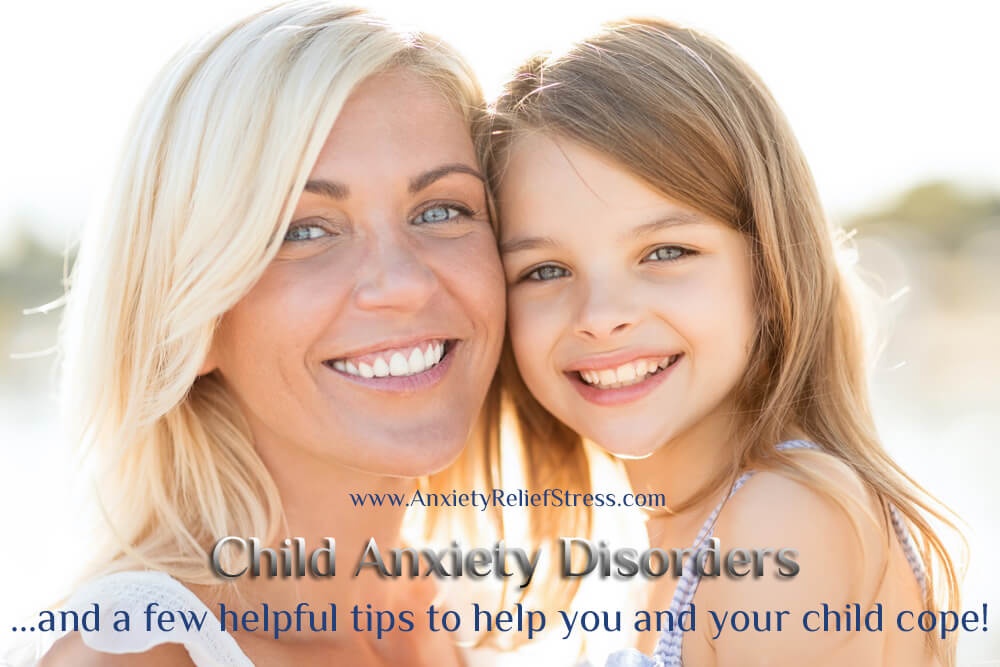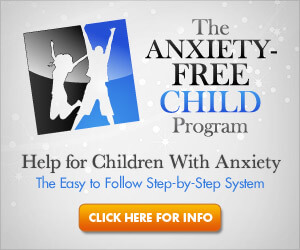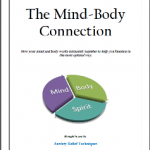All children experience some feelings of anxiety and stress. You probably remember having anxiety as a child yourself! I know I do! These feelings are usually temporary, however, feelings of anxiety can continue into the teen and adult years.

Many children don’t suffer any lasting ramifications, but today, one out of eight children suffers from a chronic child anxiety disorder and they need help to deal with these feelings.
Children need to develop skills early on to help them cope with life’s pitfalls and hurdles, and fortunately there are natural child anxiety treatments which can be helpful.
Child Anxiety Disorder Behavioral Patterns
Your child may have an anxiety disorder if they manifest some of the following behavior patterns:
- Headaches and other aches and pains that make them want to miss school or skip events where they might need to interact with others.
- Rapid heartbeats that cause the child to panic.
- Frequent stomachaches and vomiting.
- Worries about everything.
- Frequent temper tantrums.
There are many other ways that children show symptoms of anxiety, but know that any pattern of behavior that becomes problematic needs to be examined and addressed. The good news is that child anxiety disorders can be managed.
Child Anxiety Disorders and Panic Attacks
Children can learn skills to face fears and calm themselves if they panic or have feelings of anxiety. Talk to your child and reassure them them. Let them know their current feelings, they may not understand what anxiety and panic attacks are, are just feelings. Help your child learn and practice coping skills that will help next time a situation threatens to bring on a panic or anxiety attack.
- Stress and anxiety can be more difficult to cope with if the child has chronic ear infections, anemia, allergies or another disorder.
- For example, if your child is a teen and showing signs of depression, bulimia or anorexia nervosa.
- Make sure you have your child checked by your health care provider if you suspect any other symptoms.
Sometimes a child anxiety disorder may not manifest itself in disruptive behavior. Often a child can be obedient and quiet and the disorder may not catch the attention of teachers or even parents. Anxiety that’s never detected may cause other problems such as depression and panic attacks when the child reaches adulthood.
If you notice any change in your child’s behavior or if he or she becomes withdrawn or displays any of the other symptoms we discussed, seek a diagnosis. Chances are you can treat the child by helping them face their fears and develop self-esteem that will help them now – and throughout their lives.
Screening for Child Anxiety Related Disorders
Childhood anxiety disorders can be traumatic in any child’s life. Parents are also affected when they see their child struggle with fears and many don’t know where to turn to get the answers they so desperately need and want. Fortunately, there are screens for childhood anxiety related disorders and anxiety free child programs online, which are easy to access.
Screening methods can determine just how severe your child’s anxiety disorder might be and helps you to choose a path of treatment.
The online screening – and some methods used by doctors – is a series of questions such as:
- When your child enters a stressful situation does he react by clinging, freezing or having a temper tantrum?
- Have you noticed a downturn in your child’s grades at school, refusal to go to school and avoidance of social activities?
- Have you noticed that your child has many unfounded fears about situations such as storms or performing in front of a group?
These types of screening devices are preliminary steps in determining if your child may be experiencing an anxiety disorder that should be treated professionally.
- There are also questions about how often your child may cry, feel sick, cling to you or obsess over thoughts such as you dying or becoming ill.
After screening for a childhood anxiety disorder, you and your physician should sit down and decide what the next step will be to help your child cope. It may be as simple as learning how to calm the child and teaching him a few effective strategies for dealing with anxiety.
- Another option is to have your child work with a professional therapist who is much more skilled in how to help children rid themselves of debilitating fears and feelings of anxiety that keep them from enjoying life to the fullest.
- A professional therapist may suggest group therapy for your child, which is often effective when children realize that other kids have the same feelings as them. That realization can help them see that they’re not alone.
Although feelings of anxiety in a child isn’t life-threatening, prolonged symptoms could result in depression, obsessive compulsive disorder or other disorders that keep the child from enjoying all that life has to offer.
Approach a screen for childhood anxiety related disorder in a calm and helpful manner. In younger children, you may be able to help them look at the screening as a game, where they’re going to answer questions about how they feel. After the diagnosis, you can better determine the right course of action for your child.
How to Help a Child With Anxiety
Helping children deal with feelings of anxiety also helps them to deal with life problems. Each problem they face and every skill they learn will serve them well if they conquered the anxiety they faced. Knowing they can overcome problems by developing skills and facing challenges head on builds their self-confidence and lets them experience success.
- The first step in helping your child conquer an anxiety issue is to understand that such fears are normal – especially in children.
- You’ll notice anxiety with babies, toddlers, anxiety in preschool children, school-age and even high school and college age children. Quite often this manifests as what is called ‘child separation anxiety‘.
Anxieties may be different at every age, but they’re real and as children grow up, they’ll manifest their fears in various ways. Babies might cry when you leave them, school-age children may cry at being away from you in a new setting and teens might fear being on their own and making their own decisions in a “peer pressured” world.
You can help your children develop the coping skills they’ll need by remaining calm and focusing on the problem at hand.
Here are a few things you can do to help:
- Talk to your child about how fearful they truly are.
- For example, a preschooler may be traumatized by you leaving him at school, but excited about having so much play time with other children.
- Ask him if he’s happy that he’ll get to play with toys and with other children.
- Also, try and familiarize him with the school and other children there before leaving him.
- Be extremely gentle when helping children cope with an anxiety issue.
- For example, if your child seems fearful of having the light turned off in his room at night, talk to him and join him in searching every crevice and corner in the room to reassure him that everything is normal.
- A nightlight might help the transition too.
- Encourage the child to talk about his fears and anxious feelings. Don’t demean your child by dismissing those fears.
- Addressing the child’s concerns and working with him to overcome them can dispel fears he may have.
- Don’t give in to your child’s fears. Giving in only makes the fear seem more real.
- Make sure the child knows that you understand why he feels as he does, but be firm about the outcome.
- Be a role model. One strategy for helping children cope with anxiety is to let them see how you cope.
- If you react in panic mode when you’re late for work, the child will think that’s a normal reaction. However, if you react to your anxiety with a positive attitude and say things like, “I have to get up earlier next time,” the child will learn those coping techniques.
When a child is old enough to reason with, you may want to teach him deep breathing and visualization techniques. Each fear that your child overcomes will help him overcome challenges later in life. I hope you’ve found these tips helpful in helping you and your child cope with any type of teen or child anxiety disorder.
Affiliate Disclosure
My website contains affiliate links, which means if you purchase any products mentioned in my articles, I may receive a commission. If you do, thank you!







Speak Your Mind